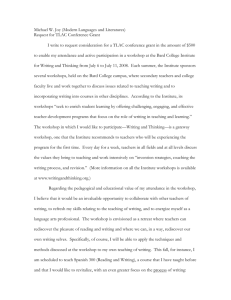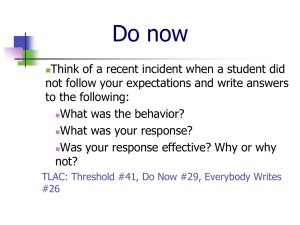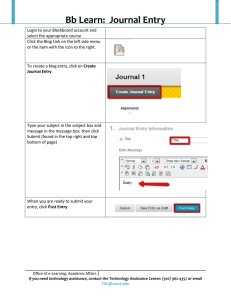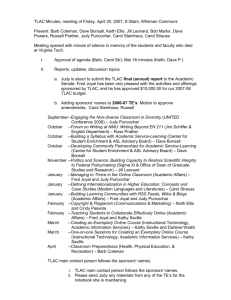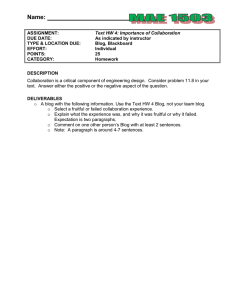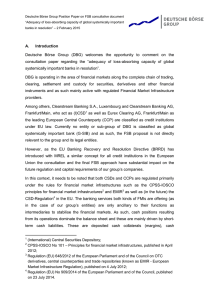SPED 689
advertisement
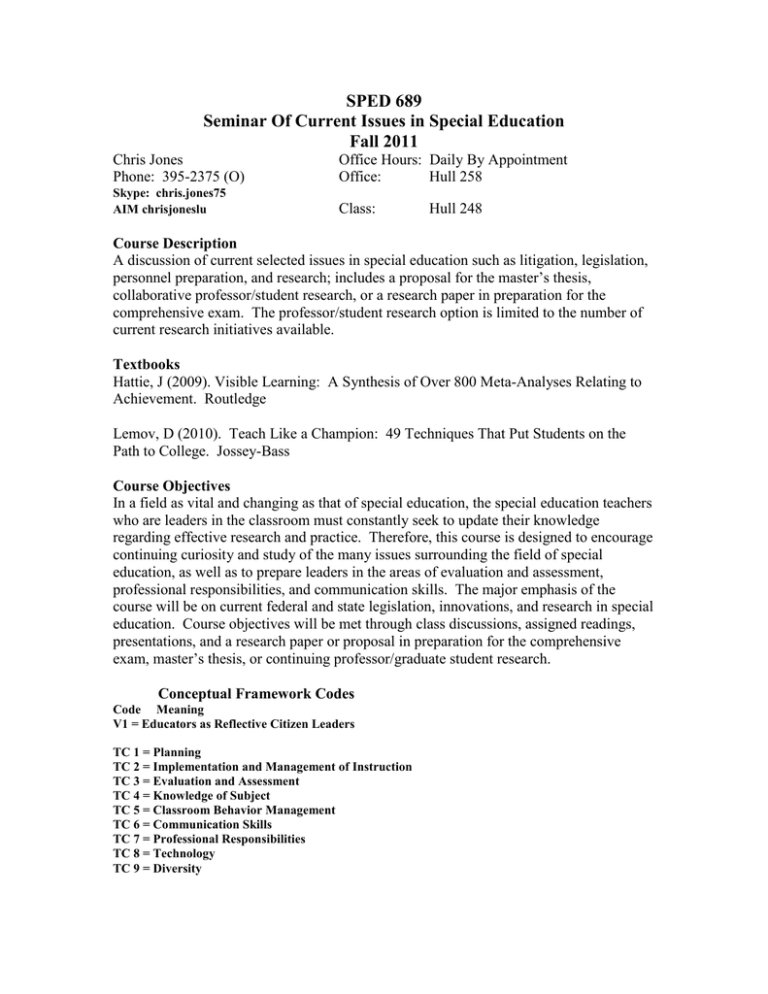
SPED 689 Seminar Of Current Issues in Special Education Fall 2011 Chris Jones Phone: 395-2375 (O) Office Hours: Daily By Appointment Office: Hull 258 Skype: chris.jones75 AIM chrisjoneslu Class: Hull 248 Course Description A discussion of current selected issues in special education such as litigation, legislation, personnel preparation, and research; includes a proposal for the master’s thesis, collaborative professor/student research, or a research paper in preparation for the comprehensive exam. The professor/student research option is limited to the number of current research initiatives available. Textbooks Hattie, J (2009). Visible Learning: A Synthesis of Over 800 Meta-Analyses Relating to Achievement. Routledge Lemov, D (2010). Teach Like a Champion: 49 Techniques That Put Students on the Path to College. Jossey-Bass Course Objectives In a field as vital and changing as that of special education, the special education teachers who are leaders in the classroom must constantly seek to update their knowledge regarding effective research and practice. Therefore, this course is designed to encourage continuing curiosity and study of the many issues surrounding the field of special education, as well as to prepare leaders in the areas of evaluation and assessment, professional responsibilities, and communication skills. The major emphasis of the course will be on current federal and state legislation, innovations, and research in special education. Course objectives will be met through class discussions, assigned readings, presentations, and a research paper or proposal in preparation for the comprehensive exam, master’s thesis, or continuing professor/graduate student research. Conceptual Framework Codes Code Meaning V1 = Educators as Reflective Citizen Leaders TC 1 = Planning TC 2 = Implementation and Management of Instruction TC 3 = Evaluation and Assessment TC 4 = Knowledge of Subject TC 5 = Classroom Behavior Management TC 6 = Communication Skills TC 7 = Professional Responsibilities TC 8 = Technology TC 9 = Diversity (V1. TC 1, TC 2, TC 3, TC 4, TC 5, TC 6, TC 7, TC 8, TC 9) Knowledge 1. To highlight the major legislative issues concerning HR 1350 and the Reauthorization of IDEA (TC 4, TC 7) 2. To understand the behavioral supports questions caused by HR 1350 and the Reauthorization of IDEA (TC 4, TC 5, TC 7) 3. Correctly identify the components of full inclusion, partial inclusion and mainstreaming and how recent trends in special education have influenced each model (TC 4, TC 7) 4. Correctly identify the procedural safeguards afforded students via their due process rights and how the proposed changes in IDEA could adversely affect those rights (TC 4, TC 7) 5. Identify the provisions of “No Child Left Behind” and The Reading First initiative (TC 4, TC 7) 6. Correctly identify the components of a Functional Behavior Assessments and it’s uses. (TC 4, TC 5, TC 7) 7. Identify the elements found in valid empirical research (TC 4, TC 7) 8. Reflect on current trends in special education legislation and identity one’s role as a educator citizen leader (V1, TC 4, TC 7) Skills 1. Be able to distinguish good solid empirical research from poorly constructed studies (TC 4, TC 7) 2. Work collaboratively with peers in developing focused workshops on current issues (TC 4, TC 7) 3. Be able to construct a through provoking literature review on a current issue (TC 4, TC 6, TC 7) 4. Be able to disseminate research findings to peers (TC 6, TC 7) 5. Students will be expected to teach and demonstrate proficiency with the 49 techniques that put students on the path to college. (TC2, TC4) Dispositions 1. To be a proactive reflective Citizen Leader (V1) 2. Demonstrate a working knowledge surrounding current sped issues (TC 4, TC 7) 3. Demonstrate an ability to reflect on current issues and assimilate new information. (V1, TC 4, TC 7) 4. Demonstrate leadership abilities by embracing the scientific methodology of problem solving (TC 4, TC 7) 5. Demonstrate competencies when writing literature reviews (TC 6) General objectives for this course include: 1. Discuss and debate major issues in the field of special education. 2. Examine a selected issue in depth either by preparing a proposal for the master’s thesis, preparing a review of an ongoing professor/graduate student research project, or a research paper in preparation for the comprehensive exam. 3. Develop leadership skills by disseminating information in the form of a topic discussion. * Please see the specific assignment descriptions for the project correlation’s with Longwood Colleges Conceptual Framework for Teacher Education Goals Course Requirements and Grading is based on a SIX point scale: 95 - 100 = A; 89 - 94 = B; 83 – 88 = C; 77 – 82 = D; 76 and lower = F Class Schedule 8-24 Introduction to Course and Current Topics Thesis and Comprehensive Exam Expectations Discussion Topic: What is a Literature Investigative Report? What is a position paper? Mini reading Assignments: In class http://www.youtube.com/watch?v=hdqxTo4C6o8 Lloyd Article Carnine Article Homework: Visible Learning: Chapters 1- 3 TLAC Chapter Pages 1 – 56 8-31 Visible Learning: Chapters 1-3 TLAC - Intro and Chapter 1 Homework: Visible: Chapter 4 TLAC : Chapter 2 Due: Position Paper #1 Blog Post for Chapter 4 http://visiblelearning.greenwoodlibrary.org/ 9-7 Round Table Discussion Topic: Writing an Investigative Report The Code: How to write this paper Visible Chapter 4 Leader ___________________ Best Practice Techniques: Chapter 2 Homework: Visible: Chapter 5 TLAC : Chapter 3 Due: Position Paper #2 Blog Post for Chapter 5 http://visiblelearning.greenwoodlibrary.org/ 9-14 Round Table Discussion Visible Chapter 5 Leader ___________________ What is Race to the Top TLAC Techniques: Chapter 3 Position Paper #2 due Homework: Visible: Chapter 6 TLAC : Chapter 4 Due: Position Paper #3 Blog Post for Chapter 6 http://visiblelearning.greenwoodlibrary.org/ 9-21 Round Table Discussion Visible Chapter 6 Leader ___________________ TLAC Techniques: Chapter 4 Position Paper #3 due Blog Post for Chapter 6 due Homework: Visible: Chapter 7 TLAC : Chapter 5 Due: Position Paper #4 Blog Post for Chapter 6 http://visiblelearning.greenwoodlibrary.org/ 9-28 Round Table Discussion Visible Chapter 7 Leader ___________________ TLAC Techniques: Chapter 5 Position Paper #4 due Blog Post for Chapter 7 due Homework: Visible: Chapter 8 TLAC : Chapter 6 Due: Position Paper #5 Blog Post for Chapter 8 http://visiblelearning.greenwoodlibrary.org/ 10-5 Writing Break 10-12 Round Table Discussion Visible Chapter 8 Leader ___________________ TLAC Techniques: Chapter 6 Position Paper #5 due Blog Post for Chapter 8 due Homework: Visible: Chapter 9 TLAC : Chapter 7 Due: Position Paper #6 Blog Post for Chapter 9 http://visiblelearning.greenwoodlibrary.org/ 10-19 Round Table Discussion Visible Chapter 9 Leader ___________________ TLAC Techniques: Chapter 7 Position Paper #6 due Blog Post for Chapter 9 due Homework: Visible: Chapter 10 TLAC : Chapter 8 Due: Position Paper #7 Blog Post for Chapter 10 http://visiblelearning.greenwoodlibrary.org/ 10-26 Round Table Discussion Visible Chapter 10 Leader ___________________ TLAC Techniques: Chapter 8 Position Paper #7 due Blog Post for Chapter 10 due Homework: Visible: Chapter 11 TLAC : Chapter 9 Due: Position Paper #8 Blog Post for Chapter 11 http://visiblelearning.greenwoodlibrary.org/ 11-2 Round Table Discussion Visible Chapter 11 Leader ___________________ TLAC Techniques: Chapter 9 Position Paper #8 due Blog Post for Chapter 11 due Homework: TLAC : Chapter 10 IR papers Rough Draft 1 due 11-9 Round Table Discussion TLAC Chapter 10 IR Rough Draft #1 Due Special Topic Homework TLAC: Chapter 11 IR Papers Rough Draft 2 11- 16 Round Table Discussion TLAC : Chapter 11 TLAC: Chapter 12 IR papers Rough Draft 2 due Homework IR final draft 11-30 Final This class schedule is subject to revision depending upon the number of graduate students in the class and the topics chosen for presentation. Students are required to read ALL of the assigned readings for the issues covered in the class. Course Assignments 1. Position Papers: You are expected to write 6 position papers. The papers should be in APA 6th ed format. a. From the readings for that week select a topic that you want to form a position on e.g. why schools reject school-wide behavior management plans. b. Identify the problem: Teachers do not want to coordinate their efforts with behavior in the same manner as they do with academic curriculum c. Identify sources in the readings (you may use outside sources) to justify your position d. Formulate a hypothesis e.g. schools with well developed school wide discipline plan increase the amount of engaged learning time e. Highlight the research that validates your point. f. Don’t stress we will work on this in class …. Your first attempt at this will probably be pretty awful ;) These papers need to be between 3 and 5 typed pages (double spaced) The position papers are worth 20% of your final grade. 2. Investigative Report: a primary objective of this course is an in-depth consideration of current issues affecting special education. Students will be required to complete a 12-15-page paper containing a thorough Investigation of the literature regarding a selected critical issue in the field of special education. The Investigative Report is worth 20% of your final grade 3. Technique Demonstrations: Students will be expected to teach and demonstrate proficiency with the 49 techniques that put students on the path to college. Technique Demonstrations are worth 10% of your final grade 4. Students are expected to attend all class sessions and must be prepared to participate fully in each debate/presentation by reading all of the assigned materials in advance. Class attendance, preparation and participation are worth 5% of your final grade. 5. Students are expected to participate in the round table discussions. Students are expected to read, reflect, and actively discuss issues surrounding the assigned readings. Students who participate in the roundtable discussion who have not read the material will be asked to leave. The participation needs to indicate that you have a fundamental understanding of the content and most importantly that you have reflected on the classroom implications. Students should actively reflect on the content provided in the articles, and the possible implications for the classroom teacher and students. Students should also hypothesize any potential problems, and propose research-validated solutions. In short, your opinion is important, but not sufficient. Systematic reflection regarding the appropriateness of the content and logistics for implementation are critical skills that you must develop as a professional. It is important to remember that during the discussion you must a) remain open-minded, b) consider alternatives c) evaluate choices d) consider the consequences of your proposed actions and decisions and e) develop self-determination skills with regards to your education and profession. The roundtable discussions are a tool for you to use to develop these skills in order to become a professional teacher. The round table discussions are worth 15% of your final grade. 6. Student Lead Round Table discussion. Individual or groups of students will lead the discussion involving their assigned chapter from the Visible Learning Text. The students must have a clear understanding of the material but they are not expected to engage in a powerpoint type lecture. Rather the students will lead the group through the complex conclusions presented in the text. Additional readings are encouraged but must be presented to the class 1 day prior to the discussion. The student Lead round table discussion is worth 20% of your final grade. 7. Blog Post. Students are expected to post to the Visible Learning Blog post for each chapter. http://visiblelearning.greenwoodlibrary.org/ The Blog posts are worth 10% of your grade.
